MINA News Agency reporter team conducted a virtual exclusive interview with the Indonesian Consul General (Konjen) for Jeddah, Saudi Arabia, Eko Hartono.
MINA team consists of Chief Editor Ismet Rauf, Senior Editor Widi Kusnadi, Head of Coverage Rana Setiawan, Head of Arabic Desk Rifa Berliana Arifin, Chief of English Desk Sajadi and International Journalist Sry Astuti.
In a special interview that was held virtually on Tuesday, the Consul General talked about the results of the evaluation of the implementation of the Umrah pilgrimage during the pandemic, plans for the implementation of the pilgrimage next year, as well as the huge business opportunities in the Saudi market.
He encouraged entrepreneurs, especially Indonesian SMEs to prepare themselves to export to Saudi Arabia. Presumably, the existing market opportunities in Saudi Arabia can be utilized as best as possible by Indonesian business actors.
Also Read: Strengthening Bridges of Friendship and Cooperation between Indonesia and African Countries
The Consul General also emphasized that business actors can understand and follow the rules applied by the Saudi government so that the products they bring can enter the Saudi Arabian market.
The Consulate General in Jeddah is one of the largest Indonesian Representatives abroad with the consideration of the large number of Indonesian citizens and the potential for extraordinary cooperation that can continue to be developed in the future, especially in the economic sector and Hajj and Umrah services.
Before starting his duties at the Indonesian Consulate in Jeddah since January 13, 2020, he served in Davao City, Republic of the Philippines, as Consul General.
The following is an excerpt from the full interview:
MINA: How is the evaluation of the Umrah implementation for prospective pilgrims from Indonesia after the first batch was held in early November?
Consul General: Indonesia has been given the honor by the Government of the Kingdom of Saudi Arabia to dispatch Umrah pilgrims at the beginning of the opening of Umrah during the pandemic since November 1, 2020.
Indonesia has dispatched 433 Umrah pilgrims. They were divided into four waves of departure, namely groups departing on November 1, 3, 8 and 22, 2020.
In detail, on November 1, 2020, there were 224 Indonesian Umrah pilgrims, then the second departure on November 3 there were 89 people, on November 8 2020 there were 46 people and then on November 22 there were 74 people.
Also Read: Ambassador: Climate Change is the Main Cause of Floods in Pakistan
In the previous Umrah implementation, 13 worshipers were confirmed positive after arriving in Saudi Arabia. As many as eight pilgrims departed in the first wave, the rest left in the second wave.
As a result, the pilgrims who departed in the first and second batches could not go on a pilgrimage to Medina because they had to undergo a longer quarantine process. While the 46 worshipers who departed in the third wave, all of them were not confirmed positive for Covid-19 so that besides being able to carry out the Umrah pilgrimage, they could also make a pilgrimage to the Prophet’s Mosque, Medina.
There are at least three things that need to be considered in evaluating the implementation of Umrah during the pandemic for Indonesian citizens.
First, there needs to be good education for the congregation regarding the current pandemic situation, because the behavior of the congregation is an important note for the Saudi Government. There is indeed a significant difference between a pandemic and normal conditions.
Second, the congregation must be disciplined and obey the rules that have been set. In this respect, the Saudis are very serious about health protocols. L So, don’t try to fake data and swab test results.
Furthermore, pilgrims must quarantine before and after Umrah, at least three days before leaving and three days after arriving in the country, self-quarantine at the Pondok Gede Hajj Dormitory Jakarta.
Meanwhile, in organizing the Hajj 2021, Saudi Arabia will refer to the evaluation of the 2020 Umrah and Hajj implementation during the pandemic.
MINA: Haw is the fate of Indonesian pilgrims who were canceled their departure for Umrah at the beginning of the Covid-19 pandemic?
Also Read: AMBASSADOR TALKS/Russian Ambassador: Attack on Ukraine Tough Choice to Make
Consul General: From the information we got, there were indeed some Umrah pilgrims who had canceled their departure. For the first and second groups I heard that there were 15 people who were positive because of Covid-19 and then could not leave. Likewise in the fourth group there were two people who were indicated as positive for Covid-19 and finally failed to leave. Soz it should have been 76 but two were canceled because they were positive, so that it became.Meanwhile for the third group, all of whom were 46 negative and could safely carry out the Umrah pilgrimage.
Now, what happened to those who failed to leave. To my knowledge, because they failed to leave, they returned to their respective homes. Will they be able to register again after a negative PCR test results? My imagination is that they can of course leave again after the PCR test results are negative. Why? because they already paid and it was even more expensive. For information, the cost of Umrah now has increased by approximately 10 million rupiah, so the previous one was around IDR 21.5 million, now it has become 31 to 34 million rupiah, so the cost is almost the same as ONH.
So indeed for those who failed to leave, they should have been allowed to leave again after this negative result, but of course this depends on the respective conversation with the Umrah Service Organizer (PPUI), whether they want to ask for a change or how I do not know it is a personal decision to talk between the prospective congregation and the organizer.
MINA: What are the latest developments in the Kingdom of Saudi Arabia’s plans for organizing the hajj pilgrimage next year?
Also Read: Palestinian Administrative Detainees Boycott Occupation Courts for 40th Consecutive Day
Consul General: We have communicated with the Ministry of Haj and Umrah Saudi, asking about the implementation of Hajj. Every year around December in previous years, so if you just say the implementation of the Hajj in 2021, this month there will be a signing of an MoU (memorandum of understanding) between Saudi Arabia and the countries sending pilgrims including Indonesia. The agreement also details the quota of pilgrims from these countries who can enter along with several other agreements, technical arrangements such as transportation accommodation and so on.
When asked about the implementation of the Hajj pilgrimage in 2021, they stated that it was too early to discuss the implementation of the Hajj.
Based on the information we have obtained from other sources, including from other parties in the Ministry of Hajj and Umrah, it seems that the implementation of the pilgrimage next year will be based on the results of evaluating the implementation of the Hajj in 2020 and the implementation of Umrah during this pandemic. So, these two things will be used as material for their evaluation to determine the process of implementing the Hajj in 2021.
Indeed, this is a different era from before. These health protocol arrangements during the Umrah period become their records and evaluations for the implementation of the Hajj in the following years. Perhaps, the first Umrah during the pandemic will be a probationary period. They have been inviting Umrah pilgrims (first during the pandemic for pilgrims from foreign countries since November 1, 2020), that is, only inviting pilgrims from Indonesia and Pakistan.
Also Read: Interview with Pakistani Ambassador to Indonesia: Kashmir Solidarity Day
The implementation of the Umrah pilgrimage is currently their evaluation material and reference for regulating the implementation of Hajj in the coming years.
The implementation of the pilgrimage during the pandemic is a challenge in itself. How do we determine, for example, whether the number of pilgrims for the pilgrimage in 2021 is the number of pilgrims in 2020 plus 10 percent in the future, we also do not know for sure the decision of the Saudi side. Regarding costs, it is also a concern Now, with the increase in fees from Saudi Arabia, from 5% to 15% it increases the cost of Hajj and Umrah.
I believe they are working hard to prepare for next year’s Haj.
MINA: How are the conditions for Indonesian citizens in Jeddah in the midst of the Covid-19 pandemic? Are there still many Indonesian citizens who over-stay? Are there still many cases of Indonesian migrant workers who do not receive their rights properly?
Also Read: Khaled Meshaal to MINA: Indonesia is at the Forefront of Those Who Support Palestinian Cause
Consul General: Are there still Indonesian citizens who are over-stayers here, yes, many, tens of thousands. We can only estimate the number.
Second, whether there was violence and then the rights also didn’t pay off, he still has it, I can’t say whether with this pandemic the number of cases that experienced violence or those whose salaries have not been paid is more than before the Covid-19 pandemic, maybe what is more important is not a comparison between before and after the pandemic but how then to handle them.
In fact, the Saudis are in general better off, which means that the number of people infected with Covid-19 who is positive with their cure rate is very high 95%. With such conditions the situation does not make us fearless, but we are still careful. Indeed, with the Covid-19 pandemic what happened was a high economic impact.
This pandemic had a major impact on economic conditions, especially in sectors that were in fact formal, such as restaurants, hotels, transportation companies and others. So that many companies lay off our workforce. From the most companies they provide full labor rights.
Also Read: Ambassador: Many Opportunities on Relationship Between Indonesia-UAE
Now, the challenge is for individual service users (individuals), the acts of violence against our migrant worker have nothing to do with the Covid-19 pandemic. As far as we know cases occur mostly in individual users.
Some of these acts of violence were triggered by our own people. Most of these cases were not pandemics but rather unfair treatment from employers. For decades they worked but their salaries did not decrease or were kept by their employers, they were promised this, then denied their rights. Like that happens a lot.
In essence, there is still overstayer, violations or persecution against migrant workers. For companies, most of our workforce has full rights. For individuals, there are many cases due to uncooperative employers.
MINA: What are the business and trade opportunities in the Saudi market?
Also Read: Exclusive Interview with Indonesian Ambassador to Afghanistan
Consul General: We fully support the efforts of Indonesian citizens here and in Indonesia to increase their trade with the Saudis. We also encourage Indonesian entrepreneurs not to hold back from exporting to Saudi Arabia.
The market opportunities that exist in Saudi Arabia can be exploited by Indonesian business actors. The opportunity is very big, there is the implementation of the Hajj for more than 200 thousand pilgrims, then there is an Umrah for 1.2 million pilgrims every year not to mention from other pilgrims. This is a very big business opportunity for us to market our MSME products.
We emphasize that business actors can understand and follow the rules applied by the Saudi government so that the products they bring can enter the Saudi Arabian market.
How about increasing their capacity in doing business. We hold trainings with diaspora friends here. The Consulate General also held virtual business matching with Indonesian entrepreneurs. So that our MSME players can increase their trade and they can sell more goods in this region.
It is not many Indonesian products have flooded Saudi markets. We urge Indonesian entrepreneurs to take advantage of the Indonesian diaspora network as their partners in developing businesses in Saudi Arabia.
Indeed, our challenge is not easy to penetrate the Saudi market. Saudi is quite strict in monitoring products circulating in its territory, especially in food, beverage and medicinal products. So, Indonesian business actors have to learn a lot to improve the quality of their products not only in matters of matters but also in the production process, starting from technical, starting from the expiration date of production, then labeling in Arabic, then ISO certification to maintain the quality of their products.
Some of their importers are diasporas who have lived in Saudi for a long time, whom we hope can help increase the marketing of Indonesian products in the Saudi market.
For information, on the closing day of the 2020 Trade Expo Indonesia – Virtual Events (TEI-VE), the Indonesian Consulate General in Jeddah facilitated the signing of two MoUs for business transactions, witnessed by the Consul General. This transaction is worth US$ 1.2 million (around IDR 4.5 billion), in the form of instant coffee products and shrimp crackers.
The number of visitors until before the closing was 7,156 people, with 3,232 people coming from 127 participating countries. The number of visitors to Saudi Arabia is the fifth highest, with 118 people, after India with 424 people, Pakistan with 160 people, the United States with 160 people, and Nigeria with 144 people. (R1/RA-1/RE-1/P2/R7/R8-P1)
Miraj News Agency (MINA)






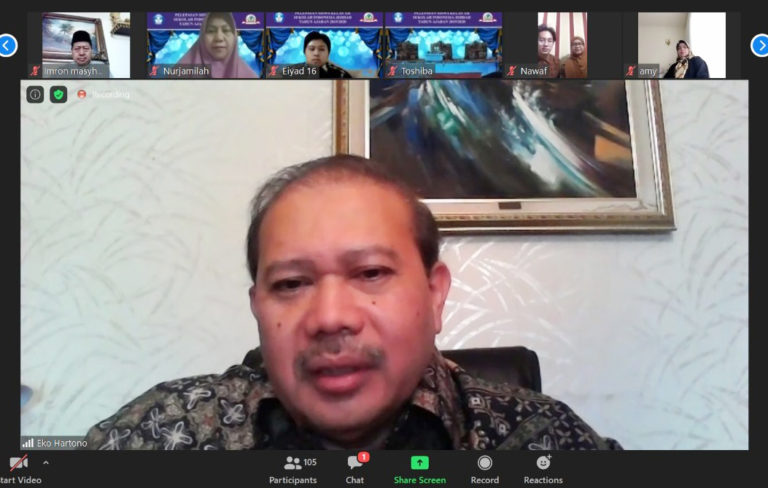






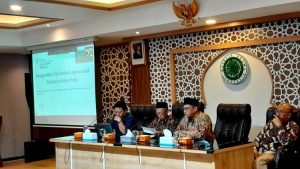


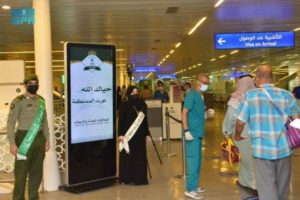



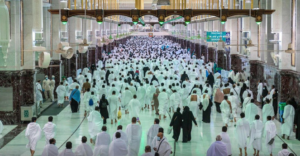






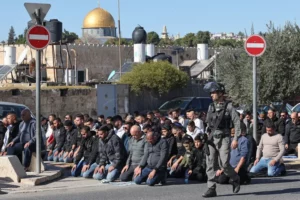




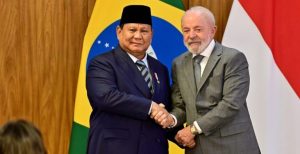
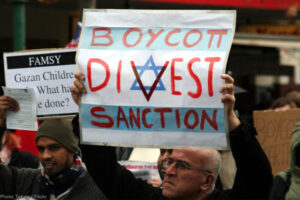



 Mina Indonesia
Mina Indonesia Mina Arabic
Mina Arabic